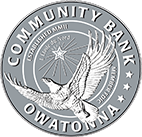By: Tim Kluender, President and CEO of Community Bank Owatonna
With the new year in full swing, most of us are working on a time-honored tradition...completing our income tax return. While the process isn't easy or fun, many people will soon reap the benefit of receiving a large tax refund. There are multiple choices about what to do with that windfall, but what are your truly best long-term options? Here are a few for your consideration:
- Pay down debt. High-interest credit card debt is the best target here. By paying off these loans (and not reborrowing on them in the future), this frees cash flow for other, much better uses. Keep one or two credit cards for emergency use only, but once you have them paid off, keep them paid off, and pay them off in full each month if they are used.
- Establish an emergency fund. If you have no credit card debt, congratulations! You now can deposit your tax refund in a savings account to cover future unexpected expenses. If you keep this fund and add to it over time, you'll be able to pay for those future surprises that always happen, such as vehicle repairs.
- Save for a down payment on a home. Once the credit card debt is gone and you have a cash reserve for emergencies, you can set your sights on buying a home. The more cash you have available to put down, the less expensive your monthly mortgage payment will be. Your mortgage is your largest expense, so it makes sense to keep it as low as possible.
- Save for retirement. If you own a home, have a cash reserve, and have no credit card debt, then it's time to think about retirement. It will arrive before you know it, and the best weapon you have on your side is time. First, make sure you are contributing to your employer-sponsored plan, as many companies will match your investments. Your employer matched dollars are free, so ensure you contribute enough to receive the full match. After that, use other tools, such as IRAs, to further supplement your retirement savings.
- Donate to a worthy cause. There are many charities to support that are doing great work. Find one that is involved in something you believe in, research it to make sure they use their donations efficiently and support their efforts. If you've reached this step in your financial journey, it's personally rewarding to help others.
- Spend it (at least some of it)! If you've done everything else above, then allow yourself to have some fun. Take that dream vacation. Update your kitchen. Whatever is important to you and your family, take some time and spend the money on it.
I hope these ideas will make you think twice before you simply cash and spend that tax refund check. Some planning ahead of time can make a huge difference down the road.
